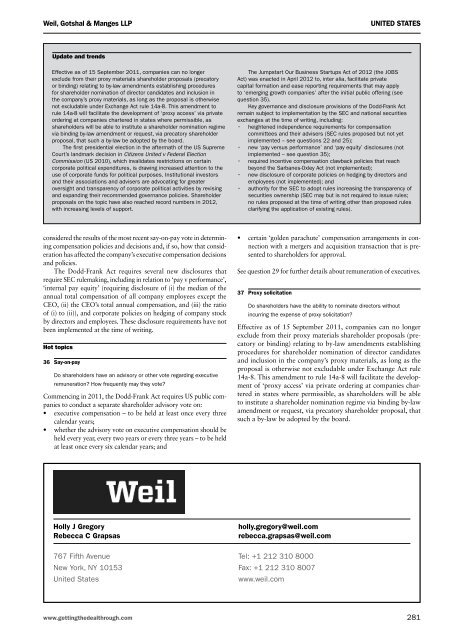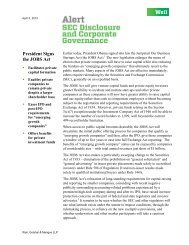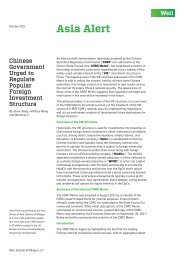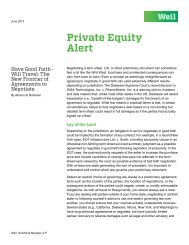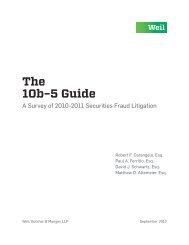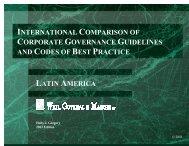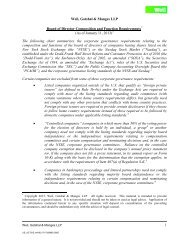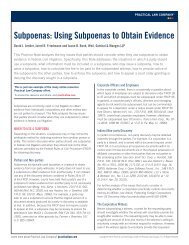Corporate Governance - Weil, Gotshal & Manges
Corporate Governance - Weil, Gotshal & Manges
Corporate Governance - Weil, Gotshal & Manges
You also want an ePaper? Increase the reach of your titles
YUMPU automatically turns print PDFs into web optimized ePapers that Google loves.
<strong>Weil</strong>, <strong>Gotshal</strong> & <strong>Manges</strong> LLP<br />
United States<br />
Update and trends<br />
Effective as of 15 September 2011, companies can no longer<br />
exclude from their proxy materials shareholder proposals (precatory<br />
or binding) relating to by-law amendments establishing procedures<br />
for shareholder nomination of director candidates and inclusion in<br />
the company’s proxy materials, as long as the proposal is otherwise<br />
not excludable under Exchange Act rule 14a-8. This amendment to<br />
rule 14a-8 will facilitate the development of ‘proxy access’ via private<br />
ordering at companies chartered in states where permissible, as<br />
shareholders will be able to institute a shareholder nomination regime<br />
via binding by-law amendment or request, via precatory shareholder<br />
proposal, that such a by-law be adopted by the board.<br />
The first presidential election in the aftermath of the US Supreme<br />
Court’s landmark decision in Citizens United v Federal Election<br />
Commission (US 2010), which invalidates restrictions on certain<br />
corporate political expenditures, is drawing increased attention to the<br />
use of corporate funds for political purposes. Institutional investors<br />
and their associations and advisers are advocating for greater<br />
oversight and transparency of corporate political activities by revising<br />
and expanding their recommended governance policies. Shareholder<br />
proposals on the topic have also reached record numbers in 2012,<br />
with increasing levels of support.<br />
The Jumpstart Our Business Startups Act of 2012 (the JOBS<br />
Act) was enacted in April 2012 to, inter alia, facilitate private<br />
capital formation and ease reporting requirements that may apply<br />
to ‘emerging growth companies’ after the initial public offering (see<br />
question 35).<br />
Key governance and disclosure provisions of the Dodd-Frank Act<br />
remain subject to implementation by the SEC and national securities<br />
exchanges at the time of writing, including:<br />
• heightened independence requirements for compensation<br />
committees and their advisers (SEC rules proposed but not yet<br />
implemented – see questions 22 and 25);<br />
• new ‘pay versus performance’ and ‘pay equity’ disclosures (not<br />
implemented – see question 35);<br />
• required incentive compensation clawback policies that reach<br />
beyond the Sarbanes-Oxley Act (not implemented);<br />
• new disclosure of corporate policies on hedging by directors and<br />
employees (not implemented); and<br />
• authority for the SEC to adopt rules increasing the transparency of<br />
securities ownership (SEC may but is not required to issue rules;<br />
no rules proposed at the time of writing other than proposed rules<br />
clarifying the application of existing rules).<br />
considered the results of the most recent say-on-pay vote in determining<br />
compensation policies and decisions and, if so, how that consideration<br />
has affected the company’s executive compensation decisions<br />
and policies.<br />
The Dodd-Frank Act requires several new disclosures that<br />
require SEC rulemaking, including in relation to ‘pay v performance’,<br />
‘internal pay equity’ (requiring disclosure of (i) the median of the<br />
annual total compensation of all company employees except the<br />
CEO, (ii) the CEO’s total annual compensation, and (iii) the ratio<br />
of (i) to (ii)), and corporate policies on hedging of company stock<br />
by directors and employees. These disclosure requirements have not<br />
been implemented at the time of writing.<br />
Hot topics<br />
36 Say-on-pay<br />
Do shareholders have an advisory or other vote regarding executive<br />
remuneration How frequently may they vote<br />
Commencing in 2011, the Dodd-Frank Act requires US public companies<br />
to conduct a separate shareholder advisory vote on:<br />
• executive compensation – to be held at least once every three<br />
calendar years;<br />
• whether the advisory vote on executive compensation should be<br />
held every year, every two years or every three years – to be held<br />
at least once every six calendar years; and<br />
• certain ‘golden parachute’ compensation arrangements in connection<br />
with a mergers and acquisition transaction that is presented<br />
to shareholders for approval.<br />
See question 29 for further details about remuneration of executives.<br />
37 Proxy solicitation<br />
Do shareholders have the ability to nominate directors without<br />
incurring the expense of proxy solicitation<br />
Effective as of 15 September 2011, companies can no longer<br />
exclude from their proxy materials shareholder proposals (precatory<br />
or binding) relating to by-law amendments establishing<br />
procedures for shareholder nomination of director candidates<br />
and inclusion in the company’s proxy materials, as long as the<br />
proposal is otherwise not excludable under Exchange Act rule<br />
14a-8. This amendment to rule 14a-8 will facilitate the development<br />
of ‘proxy access’ via private ordering at companies chartered<br />
in states where permissible, as shareholders will be able<br />
to institute a shareholder nomination regime via binding by-law<br />
amendment or request, via precatory shareholder proposal, that<br />
such a by-law be adopted by the board.<br />
Holly J Gregory<br />
Rebecca C Grapsas<br />
holly.gregory@weil.com<br />
rebecca.grapsas@weil.com<br />
767 Fifth Avenue Tel: +1 212 310 8000<br />
New York, NY 10153 Fax: +1 212 310 8007<br />
United States<br />
www.weil.com<br />
www.gettingthedealthrough.com 281


